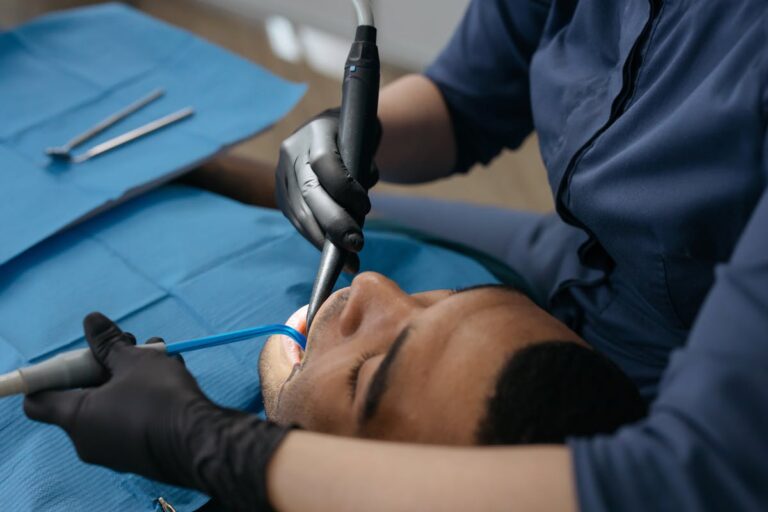Dental implants represent a pivotal advancement in restorative dentistry, particularly in Hackensack, where their application is both broad and transformative. These implants seamlessly mimic natural teeth, offering improved aesthetics and functionality while ensuring the preservation of jawbone health. Unlike traditional dentures, dental implants do not compromise surrounding teeth, providing superior durability and comfort. Explore how these innovations not only enhance oral health but also greatly boost patient confidence and self-esteem.
Improved Aesthetics and Natural Appearance
Dental implants, while primarily functional, offer significant advancements in aesthetics and natural appearance, addressing both clinical and cosmetic concerns. These prosthetic devices are meticulously engineered to mimic the natural dentition, seamlessly integrating into the oral cavity. By filling gaps left by missing teeth, implants contribute to an improved facial appearance, effectively preventing the sunken look associated with tooth loss. The titanium posts act as artificial tooth roots, supporting the facial structure and promoting a restored youthful look. This restoration is achieved by maintaining the jawbone’s integrity, preventing resorption and subsequent facial collapse. Consequently, patients experience enhanced self-esteem and confidence, as their smile is rejuvenated. The precision of implant placement and the quality of materials used guarantee a lifelike appearance and long-term durability.
Enhanced Oral Function and Comfort
Implants markedly enhance oral function by providing a stable and secure foundation for prosthetic teeth. This structural integrity allows for increased bite force, enabling patients to engage in effective mastication of diverse dietary substances. The osseointegration process guarantees that the implant integrates seamlessly with the jawbone, thereby facilitating improved oral sensitivity. This heightened sensitivity is critical for patients to discern various textures and temperatures, which is integral to oral satisfaction and function.
Furthermore, dental implants minimize the discomfort associated with traditional dentures, which can often lead to sore spots and irritation. The fixed nature of implants prevents slippage and enhances comfort during oral activities. By restoring functional capabilities, dental implants contribute extensively to the overall oral health and quality of life for individuals.
Long-lasting Durability and Reliability
Dental implants demonstrate long-lasting durability and reliability through their capacity to integrate with the jawbone, providing strengthened structural support. This osseointegration not only enhances chewing efficiency but also secures a stable and permanent tooth replacement solution. Consequently, dental implants serve as a viable long-term alternative to traditional prosthetics, minimizing the need for subsequent interventions.
Strengthened Jawbone Support
Frequently overlooked in dental procedures, the integration of strengthened jawbone support plays a pivotal role in the efficacy of dental implants. Dental implants facilitate bone density enhancement by promoting the stimulation of jawbone growth. This process is initiated when the implant fixture is surgically inserted into the jawbone, mimicking the natural root structure of a tooth. The biocompatible material of the implant interacts with the jawbone, encouraging osteointegration, which effectively secures the implant. This physiological response not only fortifies the structural integrity of the jaw but also mitigates bone resorption, a common consequence of tooth loss. The resultant increase in bone density guarantees the long-term stability and functionality of the implant, providing a robust foundation for prosthetic teeth in restorative dentistry.
Enhanced Chewing Efficiency
Often overlooked in discussions about dental restoration, enhanced chewing efficiency is a critical outcome directly linked to the long-lasting durability and reliability of dental implants. Dental implants are engineered to mimic the natural tooth structure, providing an enhanced bite force that considerably surpasses traditional dentures or bridges. This increased bite force results in unparalleled chewing capacity, allowing individuals to effectively process a wide range of food textures with ease. The osseointegration process, wherein the implant fuses with the jawbone, guarantees that the implant remains stable under the mechanical stresses of mastication. Consequently, patients experience improved masticatory performance and nutritional intake. This functionality is pivotal for maintaining oral health and overall well-being, underscoring the importance of dental implants in restorative dentistry.
Permanent Tooth Replacement
A paramount advantage of dental implants is their capacity to serve as a permanent tooth replacement solution, offering exceptional longevity and reliability. Engineered to integrate seamlessly with the jawbone through osseointegration, implants exhibit a structural stability unmatched by alternative prosthetic options. This integration not only guarantees prolonged functionality but also preserves alveolar bone integrity, mitigating resorption. The convenient procedure of dental implant placement involves a minimally invasive approach, utilizing advanced imaging techniques to precisely position titanium fixtures within the alveolar ridge. This method minimizes trauma to surrounding tissues and accelerates the healing process. As a result, patients benefit from an enduring prosthetic solution that replicates the natural dentition’s aesthetics and function, consequently enhancing overall oral health and quality of life.
Preservation of Jawbone Health
The preservation of jawbone health is a critical consideration in dental implantology, as it directly influences the long-term stability and success of implants. When a tooth is lost, the underlying alveolar bone can undergo resorption due to lack of stimulation. Dental implants provide necessary mechanical stimulation, facilitating bone density preservation. This process prevents further bone loss, which is paramount for maintaining structural integrity. By preserving bone density, implants contribute to an improved facial structure, preventing the sunken appearance associated with bone loss. This not only optimizes aesthetic outcomes but also guarantees functional support for the facial musculature. In Hackensack, dental professionals prioritize these physiological benefits to enhance patient outcomes, underscoring the importance of dental implants in restorative dentistry practices.
No Impact on Surrounding Teeth
In addition to preserving jawbone health, dental implants offer the advantage of leaving surrounding teeth unaffected, a key consideration in restorative dentistry. Unlike traditional bridges that necessitate the alteration of adjacent teeth for support, dental implants provide a self-supportive solution. The implant acts independently, ensuring there is no impact on adjacent teeth. This approach eliminates the need for grinding or modifying neighboring structures, consequently maintaining the integrity and health of surrounding dentition.
Moreover, by avoiding stress on adjacent teeth, dental implants help prevent potential complications such as tooth decay or structural weakening often associated with other restorative methods. The preservation of natural tooth structures is critical in maintaining overall oral health, making dental implants a preferable choice for individuals seeking long-term dental restoration solutions.

Boosted Patient Confidence and Self-Esteem
Dental implants considerably contribute to boosted patient confidence and self-esteem through enhanced smile aesthetics and improved oral function. The restoration of dental structures via implants offers an improved appearance, facilitating a more natural and aesthetically pleasing smile. Additionally, the functional benefits, such as better mastication and speech, further reinforce a patient’s self-assurance in social and professional interactions.
Enhanced Smile Appearance
For individuals seeking restorative dental solutions, achieving an enhanced smile appearance through implants can tremendously boost patient confidence and self-esteem. Dental implants serve as an effective intervention to restore facial harmony by replacing missing teeth with prosthetics that closely mimic natural dentition. This procedure results in enhanced facial features, as implants provide the necessary support to maintain the structural integrity of the jawline and surrounding tissues. By preventing bone resorption and ensuring ideal spacing, implants contribute to a more symmetrical and aesthetically pleasing appearance. The integration of these implants into the jawbone further stabilizes facial contours, reducing the signs of aging caused by tooth loss. Consequently, patients experience improved self-perception, leading to a positive impact on psychological well-being.
Improved Oral Function
Oral functionality is considerably enhanced through the strategic integration of dental implants, offering patients a pronounced improvement in their ability to perform essential tasks such as chewing and speaking. This advancement is attributed to the implants’ design, which mimics natural teeth roots, providing stability and support. The enhanced facial structure resulting from these implants contributes to improved speech clarity, as it prevents common issues such as slurring or lisping often associated with dentures or missing teeth. Additionally, the restoration of proper occlusion facilitates efficient mastication, thereby optimizing digestive processes and nutritional intake. The implants’ biocompatible materials guarantee seamless integration with the jawbone, promoting long-term durability and function. Consequently, patients experience a significant boost in confidence and self-esteem due to restored oral capabilities.
Ease of Maintenance and Oral Hygiene
Maintaining dental implants requires minimal effort compared to traditional dental prosthetics, as they are designed to integrate seamlessly with natural oral structures. This integration facilitates reduced cleaning time and promotes effortless maintenance, considerably enhancing the patient’s oral hygiene regimen. Dental implants eliminate the need for specialized cleaning solutions or devices, further simplifying daily oral care.
The surface of dental implants is resistant to plaque accumulation, reducing the risk of peri-implant diseases. Regular brushing and flossing are sufficient for maintaining ideal hygiene, mirroring the care routine of natural teeth. Additionally, dental implants do not require periodic adjustments or replacements, as seen in dentures or bridges, streamlining long-term maintenance. This ease of care underpins dental implants as a superior choice for restorative dentistry.
Advances in Dental Implant Technology
Building on ease of maintenance, recent advancements in dental implant technology have considerably enhanced their functionality and integration capabilities. Innovations in digital imaging and computer-aided design/manufacturing (CAD/CAM) have facilitated increased precision in implant placement. This precision minimizes the risk of damage to surrounding anatomical structures and optimizes the alignment of the prosthetic components. Additionally, the development of biocompatible materials with superior osseointegration properties has accelerated the healing process, thereby reducing treatment time. Three-dimensional printing technology has further contributed to the customization of implants, ensuring a tailored fit for each patient. The integration of these technologies not only enhances the long-term success of implants but also streamlines the surgical procedure, offering improved outcomes for patients seeking restorative dentistry in Hackensack.
Accessibility and Affordability in Hackensack
How accessible and affordable are dental implants for residents in Hackensack? Dental implants in Hackensack are increasingly accessible due to advancements in both local service availability and financial accommodations. Clinics offer convenient payment plans, allowing patients to break down the cost into manageable installments. This approach facilitates broader access to restorative dental care without the immediate burden of full upfront payment. Additionally, flexible financing options are provided, often in collaboration with financial institutions, to verify that dental treatments align with individual financial circumstances. These financing mechanisms are essential in mitigating the economic barriers associated with dental implant procedures. By adopting such financial strategies, Hackensack’s dental clinics enhance the affordability of implants, making them a viable option for a diverse demographic spectrum.
Frequently Asked Questions
What Are the Potential Risks or Complications of Dental Implant Surgery?
Potential risks of dental implant surgery include possible implant failure and increased risk of infection. Factors such as inadequate bone density, improper placement, and peri-implantitis can contribute to these complications, necessitating thorough preoperative assessment and meticulous surgical technique.
How Long Does the Dental Implant Procedure Take From Start to Finish?
The dental implant procedure duration varies, typically spanning several months. The dental implant surgical timeline includes initial consultation, surgical placement, osseointegration period (3-6 months), and final prosthetic attachment, contingent on individual healing rates and clinical conditions.
Are Dental Implants Suitable for Everyone, Regardless of Age or Health Condition?
Dental implants may not be suitable for everyone. Oral health considerations and individual health factors, such as bone density and medical conditions, play pivotal roles in determining candidacy. Thorough evaluation by a dental professional is essential for appropriate treatment planning.
What Dietary Restrictions Should One Follow After Getting Dental Implants?
Post-procedure, patients should adhere to a soft food diet to mitigate implant site stress. Nutritional considerations include incorporating protein-rich soft food options like yogurt and scrambled eggs, ensuring adequate nutrient intake during the initial healing phase.
How Should One Manage Pain or Discomfort Post-Dental Implant Surgery?
Post-dental implant surgery, pain management involves adhering to prescribed medication regimens and diligently following post-operative instructions. Analgesics, often NSAIDs, are recommended to alleviate discomfort, while maintaining oral hygiene protocols minimizes infection risk, promoting ideal healing outcomes.






